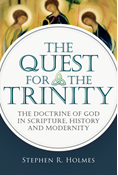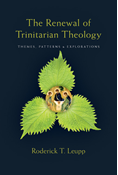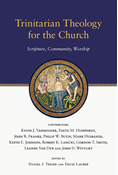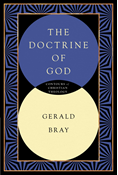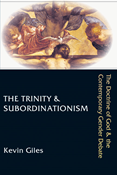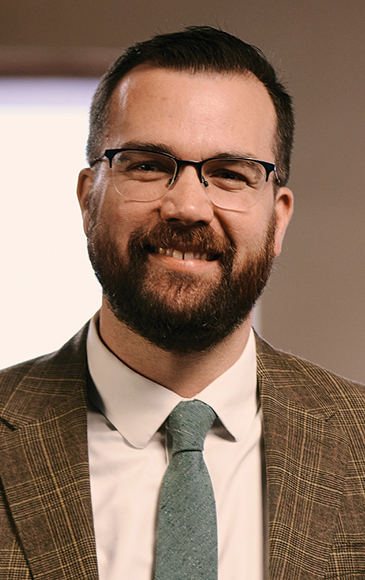
|
On Classical Trinitarianism
ebook
|
- Length: 824 pages
- Published: October 01, 2024
- Imprint: IVP Academic
- Item Code: A0035
- ISBN: 9781514000359
-
Other Retailers:
Amazon*
*affiliate partner
-
hardcover
Modern theology claimed that it ignited a renaissance in trinitarian theology. Really, it has been a renaissance in social trinitarianism. Classical commitments like divine simplicity have been jettisoned, the three persons have been redefined as three centers of consciousness and will, and modern agendas in politics, gender, and ecclesiology determine the terms of the discussion. Contemporary trinitarian theology has followed the spirit of this trajectory, rejecting doctrines like eternal generation which were once a hallmark of Nicene orthodoxy and reintroducing subordinationism into the Trinity.
Motivated by the longstanding need to retrieve the classical doctrine of the Trinity, theologian Matthew Barrett brings together Protestant, Roman Catholic, and Eastern Orthodox scholars to intervene in the conversation. With over forty contributions, this ecumenical volume resurrects the enduring legacy of Nicene orthodoxy, providing a theological introduction that listens with humility to the Great Tradition.
In On Classical Trinitarianism, you find contributions from a wide range of scholars, including:
- Katherin Rogers
- Andrew Louth
- Gilles Emery
- Steven Duby
- Gavin Ortlund
- Adonis Vidu
- Carl Trueman
- Matthew Levering
- Fred Sanders
- Scott Swain
- Karen Kilby
- Amy Peeler
- Thomas Joseph White
- and more!
The distinct yet united voices of On Classical Trinitarianism summon the next generation to move past modern revisionism for the sake of renewing classical trinitarian theology today. Together, they demonstrate that Nicene orthodoxy can endure in the modern world and unite the church catholic.
"One will be hard-pressed to find a more comprehensive explanation of trinitarian doctrine than this collection of essays. Matthew Barrett has assembled a prestigious team of scholars to explain what the Trinity is and why it still matters. On Classical Trinitarianism is an outstanding achievement in modern scholarship on the Christian doctrine of God."
"On Classical Trinitarianism is a breathtaking accomplishment. An astonishing array of contributions maps the field of trinitarian theology—historical, dogmatic, and polemical. The forty chapters, written by prominent theologians from each of three major branches of the church, are a major refutation of the so-called revival of the Trinity in twentieth-century theology. This publication is a serious, in-depth reassertion of classical Nicene theology over against the recent onslaught of social trinitarianism with its rationally comprehensible and compositional (and, often, subordinationist) view of the Trinity. Anyone attempting a return to the social trinitarianism of the previous century will have to reckon with Matthew Barrett's major accomplishment in this volume."
"Evangelical retrieval of classical trinitarianism is a vital project. This massive resource represents various approaches and levels of polemical intensity along with a core set of convictions. I can't believe I read the whole thing! But its many fine essays convey valuable insights, sound some necessary alarms, and pose enduring questions."
"This admirable book makes the rediscovery of trinitarian theology truly exciting. After showing the struggles of the early Fathers for an adequate terminology to express the mystery of the Trinity, it carefully traces the history of the doctrine. The book also provides a healthy corrective to the many ways that contemporary theology has strayed from the tradition of Nicaea."
"With a wide variety of historical, dogmatic, and critical essays, this book invites and equips its readers to join the revival of classical trinitarian theism."
"Like a meteor on the scene of contemporary theology, Matthew Barrett's edited volume, On Classical Trinitarianism, makes a big impression. Physically, it is a massive book, full of hefty articles by many of the world's leading theologians. Intellectually, it is an equally massive response to recent innovations in the doctrine of God—from social trinitarianism to eternal functional subordinationism—in favor of orthodox trinitarian theology and its attendant doctrine of divine simplicity. It is also a reminder of the importance of thinking with ecclesial tradition and of the corresponding dangers, when talking about the profoundest of mysteries, of trying to think about God apart from it—lest even Christians forget that they are trinitarian monotheists and that God is simply Father, Son, and Spirit."
"Matthew Barrett's remarkable collection shows evangelicalism getting its doctrinal house in order, but its importance also lies well outside evangelicalism as an ecumenical collection: in authorship, mood, method, and—most of all—common confession of the Nicene faith. Everything we could wish for is here in abundance: attention to the Bible, history, doctrine, texts, figures, and vocabulary. Like some collection of glorious music or poetry offered on the anniversary of a beloved monarch as a 'garland,' On Classical Trinitarianism is a magnificent garland in honor of the Nicene Creed after seventeen centuries."
"This is a marvelous primer on the church's historic understanding of the Trinity. Its topics and authors have been very well chosen. May God use it to renew our discipleship today, growing everyone who reads it in the knowledge and love of God."
"The Trinity gives coherence to Christian faith and life. While multiauthor volumes often lack coherence, a beautifully biblical and classically catholic vision of the Trinity draws these contributors together. Presenting a positive, and overwhelmingly persuasive, depiction of ideas such as divine simplicity, processions, missions, and appropriations, this book has potential to change permanently how many modern Christians think about the Trinity. Though it is likely naive to hope that this will be the case, this material should kill and bury any notion of subordination in the Trinity, showing that such dead ideas are incompatible with the living faith of the church. A lot remains at stake in trinitarian theology, and this volume goes a long way toward illustrating why and how."
"On Classical Trinitarianism is the most significant text published this year, if not this century. While a trinitarian renaissance certainly began in the twentieth century, distinctly modern and postmodern echoes of ancient heresies arose to challenge believers who seek to restate with integrity for our day 'the faith that was once for all delivered to the saints' (Jude 1:3). The scholars herein, wisely gathered by Matthew Barrett, not only represent a wide spectrum of Christian tradition but offer deep studies into orthodoxy's exegetical and historical basis and helpfully describe the contours of this indispensable dogma. Renewing our understanding of God the Trinity so that we may worship him truly and confess him properly will be the best way to celebrate the signal accomplishment of Nicaea. So, please, take up and read!"
"On Classical Trinitarianism presents not a 'Nicene option' but the Nicene necessity . Against the revisionism of some of the most popular trinitarian theologians of the last fifty years, a team of mature theologians makes the definitive case that Nicaea's trinitarian theology is materially necessary for a biblical, evangelical, catholic, and orthodox faith. This is the best kind of polemic—one in which the positive vision outshines the object of critique."
"Matthew Barrett has compiled the perfect guest list of authors to celebrate the 1700th anniversary of the Council of Nicaea. This is the perfect textbook for learning the biblical and trinitarian grammar of God—and for learning why retrieving classical trinitarianism matters more than ever."
"The essays in this collection, individually and collectively, offer a comprehensive account of that fundamental doctrine of the Christian faith, the mystery of the Trinity. Attempts by some theologians to squeeze and crush that mystery into a new scholasticism of expectations have to be deflected, pushed back, from within a robust appreciation of what we have been given in good faith and hope. Contemporary theology has replaced the burden of false histories by a bondage to the future. Our faith has become suspended between the past and the future. Our memory of that faith has sometimes become weak and patchy, and wherever memory fades, so too does Christian identity. Here in these essays, new voices of classical Christianity are giving us the means to bring 'what has been' together with 'what we are now'; with this collection we have been given an opportunity to act, to live within our faith today and grow in devotion. The essays in On Classical Trinitarianism deserve to be recognized as signs that there still is a right path: that hard-earned scholarship can still point the way for those who seek direction or strengthening. In these essays, the reader finds the fundamental doctrine of Christian faith—God existing in the reality of Trinity—received, remembered, and given energy and clarity. The result is a diverse collection of insights, explorations, and renewal that remains true to the authentic history of Christian faith seeking understanding. Reading these essays, you will recognize both true scholarship at work and the present fruits of the Spirit."
CONTENTS
Foreword by J. Todd Billings
Acknowledgments
The Nicene Creed: Or the Niceno-Constantinopolitan Creed, AD 381
Introduction: The Prospect and Promise of Classical Trinitarian Theology
Matthew Barrett
Part 1: Retrieving Nicene Trinitarianism
1. Ante-Nicene Trinitarianism: From Confession to Theology
Donald Fairbairn
2. The Nicene Creed: Foundation of Orthodoxy
Christopher A. Hall
3. The Beginnings of a Pro-Nicene Trinitarian Vision: Athanasius of Alexandria on the Activity of the Son and the Spirit
Amy Brown Hughes and Shawn J. Wilhite
4. Hilary of Poitiers, on the Unity and Distinction of Father and Son: A Pro-Nicene Reading and Use of John 5:19
Carl L. Beckwith
5. The Cappadocians and the Maturity of Nicene Vocabulary
Stephen Hildebrand
6. Maximos and John Damascene: Mid-Byzantine Reception of Nicaea
Andrew Louth
7. Augustine of Hippo: Will the Real Augustine Please Stand Up?
Keith E. Johnson
8. Anselm of Canterbury: Faith Seeking Trinitarian Understanding
David S. Hogg
9. Thomas Aquinas's Appropriation of Pro-Nicene Theology of the Trinity
Gilles Emery, OP
10. Creedal Critics or Creedal Confessors? The Reformers and the Reformed Scholastics
J. V. Fesko
11. A Fading of the Trinitarian Imagination: The Fight for Nicene Confessionalism in the Eighteenth and Nineteenth Centuries
Michael A. G. Haykin
Part 2: Trinitarian Hermeneutics and Nicene Dogmatics
12. The Incomprehensibility of the Holy Trinity
Ronni Kurtz
13. Trinity, Creatures, and Hermeneutics: Accounting Properly for both Theologia and Oikonomia
Richard C. Barcellos
14. The Unity of God and the Unity of the Economy
Steven J. Duby
15. Perfect Being Theology and Classical Trinitarianism
Katherin A. Rogers
16. Trinity and Divine Simplicity
James E. Dolezal
17. Three Persons, One Will
Stephen J. Wellum
18. Trinity and Aseity
Gavin Ortlund
19. The Immutable and Impassible Trinity—Part 1: The Biblical Teaching and Early Patristic Thought
Thomas G. Weinandy
20. The Immutable and Impassible Trinity—Part 2: The Early Councils, Further Theological and Christological Developments, and Soteriological and Pastoral Implications
Thomas G. Weinandy
21. Trinity and Love
Matthew Levering
22. The Unbegotten Father
John Baptist Ku
23. Only Begotten God: Eternal Generation, a Scriptural Doctrine
Charles Lee Irons
24. Only Begotten Son: The Doctrinal Functions of Eternal Generation
Fred Sanders
25. No Impassibility, No Eternal Generation: Retrieving a Pro-Nicene Distinctive
Matthew Barrett
26. The Procession of the Spirit: Eternal Spiration
Chris R. J. Holmes
27. The Spirit's Procession Revealed in the Spirit's Mission: An Augustinian Account
Adonis Vidu
28. Three Agents, One Agency: The Undivided External Works of the Trinity
Scott R. Swain
29. Trinity and Appropriations: Meaning, Practice, and Significance
Josh Malone
Part 3: The Renewal of Nicene Fidelity Today
30. Social or Classical? A Theological Dialogue
Michael Allen and Matthew Barrett
31. Three Versus One? Some Problems of Social Trinitarianism
Stephen R. Holmes
32. Perichoresis and Projection: Problems with Social Doctrines of the Trinity
Karen Kilby
33. Is There Obedience in God? Nicene Orthodoxy and the Eternal Procession of the Son in Aquinas and Barth
Thomas Joseph White
34. Renaissance or Revision? Metaphysical Departures from Classical Trinitarian Theism
Craig A. Carter
35. Are Evangelicals Nicene Trinitarians? Evangelicalism's Debt to Social Trinitarianism
D. Blair Smith
36. Reforming the Trinity? The Collapse of Classical Metaphysics and the Protestant Identity Crisis
Carl Trueman
37. The Need for Nicene Exegesis: Eternal Functional Subordination's Hermeneutical Innovation
Amy Peeler
38. The Need for Nicene Dogmatics: Eternal Functional Subordination's Dogmatic Inadequacy
Glenn Butner
39. The Trinity Is Still Not Our Social Program: The Trinity and Gender Roles
Samuel G. Parkison
40. Biblicism and Heterodoxy: Nicene Orthodoxy, Ecclesiastical Accountability, and Institutional Fidelity
Michael Horton
List of Contributors
General Index
Scripture Index


